This article was co-authored by Wendy Powell and by wikiHow staff writer, Danielle Blinka, MA, MPA. Wendy Powell is a Maternal Health and Exercise Specialist and the Founder and CEO of MUTU System, the world's best-selling, medically recommended online fitness education program for mothers. Wendy specializes in pregnancy, post-baby recovery, postpartum exercises, fitness education, and body confidence. Wendy works to shift the conversation on women's bodies towards equality and empowerment for health, confidence, and power. She is a published author, international speaker, and award-winning entrepreneur. Wendy is on the Women's Development Board of the MicroLoan Foundation and is a frequent contributor to the BBC. MUTU System has been featured in Vogue, the Huffington Post, Fox News Health, Daily Mail, and The Guardian, and is recommended by Hollywood Trainer, Jeanette Jenkins.
There are 10 references cited in this article, which can be found at the bottom of the page.
This article has been viewed 60,730 times.
Hemorrhoids are a common condition that can make you very uncomfortable, often causing pain, itching, and bleeding during bowel movements. They’re caused by swollen veins, similar to varicose veins, in your anal area.[1] If you’re prone to developing hemorrhoids or at higher risk due to pregnancy, you’ll be happy to know it’s possible to reduce your chances of getting them. With healthy bowel habits, dietary changes, and lifestyle adjustments, you can reduce your risk of hemorrhoids!
Steps
Using Healthy Bowel Habits
-
1Use the restroom as soon as you feel the need to go. Delaying a bowel movement can cause your stools to harden. This makes them harder to pass, making you strain. Since straining can cause hemorrhoids, this increases your risk.[2]
- Don’t try to hold in bowel movements! Excuse yourself to the restroom as soon as you can.
-
2Avoid straining to have a bowel movement.[3] If you feel the urge to go but can’t, it’s best to get up and walk around. This can help loosen your bowels without straining. If you regularly strain when you have a bowel movement, especially while holding your breath, you might cause a hemorrhoid.[4]
- Straining is a sign of constipation. If you find yourself frequently straining to have a bowel movement or if you are unable to have a bowel movement more than 3 times a week, talk to your doctor.[5] They can help you figure out what is causing your constipation and suggest treatment options.
- Movement, such as walking, can keep waste moving through your bowels. If this doesn't work, talk to your doctor about taking a stool softener, which can make your bowel movements pass more easily.
- Raising your feet with a stool while you go to the bathroom can help prevent straining.[6]
Advertisement -
3Leave the toilet as soon as you’re finished. Reading in the bathroom or playing on your phone is a common way to pass the time. However, don’t let that keep you on the toilet once you’ve finished relieving yourself. Lingering on the toilet can strain your anal area, increasing your risk of hemorrhoids.[7]
- Don’t allow reading material, your phone, or a handheld game in the bathroom if you feel tempted to sit on the toilet longer than necessary.
- If you are struggling with constipation, your doctor may recommend bringing some entertainment into the bathroom with you to encourage relaxation and help you go. In general, however, it’s best not to spend more than 10 minutes on the toilet if you can help it.
-
4Use moist wipes instead of toilet paper to gently clean yourself. Moist wipes are a good option if you are prone to irritation and hemorrhoids. They clean your anus better than toilet paper. Additionally, they’re gentler on the area, reducing irritation and providing relief if you have hemorrhoids already. You can find wet towelettes for use on your genitals and anus in the toilet paper aisle.
- Check the label to make sure your towelettes are fragrance and alcohol free. These ingredients can irritate the area.
- Only use wipes labeled for bathroom use.
-
5Talk to your doctor if you have chronic diarrhea or constipation. Both chronic diarrhea and constipation can increase your risk of hemorrhoids. Diarrhea makes you spend more time in the restroom and requires that you wipe your anus more. Constipation makes you more likely to strain to have a bowel movement and makes your bowel movements harder.[8]
- Your doctor may help you find relief.
- If you have alternating diarrhea and constipation, there may be an underlying medical condition causing these issues. See your doctor to get a diagnosis and discuss treatment options.
-
6Keep your anal area clean if you develop hemorrhoids. This will help you minimize your discomfort and help the area heal faster. Wash your anal area daily with soap and warm water.[9]
- Make sure the soap you use to clean your anal area doesn’t have fragrance or alcohol.
- If you’re at high risk of developing hemorrhoids, consider getting a bidet or a handheld shower head that you can use for rinsing your anal area.
Changing Your Diet
-
1Drink at least 8 8 fl oz (240 mL) glasses of fluids daily. Drinking plenty of fluids each day helps keep your stools soft. This makes it less likely you’ll need to strain to have a bowel movement.[10] Any fluids can help you stay hydrated, including water, juices, tea, and soups.
- If you want to flavor your water to make it tastier, add sliced fruit to it.
- If you're pregnant, it's best to drink at least 10 glasses of fluids daily to make sure you stay hydrated.[11]
- Children don't require as much fluids as adults. Here's a breakdown of the recommended fluid intake for kids:[12]
- Children aged 1-3 need 1 litre (4.2 c) per day
- Children aged 4-8 need 1.2 litres (5.1 c) per day
- Children aged 9 through puberty need 1.5 litres (6.3 c) per day
-
2Eat your recommended daily amount of fiber. Eating a high fiber diet helps keep your stool moving through your bowels. Eat plenty of fruits, vegetables, legumes, and whole grains, which all contain fiber. Great options include broccoli, kale, sweet potatoes, apples with skin, berries, beans, lentils, and high-fiber cereals.[13]
- Up to age 50, daily fiber recommendations are 25 grams for women and 38 grams for men. After age 50, fiber recommendations drop to 21 grams for women and 30 grams for men.[14]
- If you struggle to meet your daily recommendation, you can add a fiber supplement to your diet. However, talk to your doctor first.
-
3Maintain a healthy weight with a balanced diet. Obesity is a common cause of hemorrhoids because it puts pressure on your body. This is especially true for obese people who sit for long periods of time. You can reduce your risk by keeping your weight in a healthy range for your age and height.[15]
- Eat meals that contain about half vegetables, ¼ lean proteins, and ¼ starchy vegetables. For example, you might eat a small salad, a cup of broccoli, 3 ounces (85 g) of fish, and a half cup of roasted sweet potatoes.
- People who are underweight are also at risk of developing hemorrhoids. Talk to your doctor or a dietitian about the best way to achieve a weight that is healthy for you.
Adjusting Your Lifestyle
-
1Exercise for at least 30 minutes per day. In addition to helping you maintain a healthy weight, daily exercise keeps your bowel moving and helps avoid constipation. It also helps you relieve the pressure on your anal veins, reducing your risk of developing hemorrhoids. Here are some great exercises to try:[16]
- Walking
- Running
- Dancing
- Aerobics
- Swimming
- Group gym classes
- Yoga
-
2
-
3Avoid heavy lifting if you have chronic hemorrhoids. Whether you’re lifting heavy objects or weights, you’re putting stress on your entire body. This includes the veins in your anal region. Straining to lift can cause hemorrhoids or exacerbate them.[18]
- Ask for help when you need to move something heavy.
- Follow a strength training routine that doesn’t use heavy weights. For example, you might lift lighter weights or do body weight exercises.
-
4Take warm baths to relax your anal area. Baths not only soothe existing hemorrhoids, they also help with prevention. Make sure your water is warm, not too hot, which can irritate your skin. Soak in the tub for at least 20 minutes.[19]
- You might also add Epsom salts into your bath.
-
5Use caution with anal sex. Anal sex can increase your risk of developing hemorrhoids because it strains the area.[20] If anal sex is part of your sexual lifestyle, have a conversation with your doctor about how to do it safely and minimize your risk of hemorrhoids.[21]
- If you currently have hemorrhoids, avoid having anal sex until they heal. Anal sex could exacerbate any hemorrhoids that are already present.
Expert Q&A
Did you know you can get expert answers for this article?
Unlock expert answers by supporting wikiHow
-
QuestionHow can I avoid hemorrhoids when I'm pregnant?
 Wendy PowellWendy Powell is a Maternal Health and Exercise Specialist and the Founder and CEO of MUTU System, the world's best-selling, medically recommended online fitness education program for mothers. Wendy specializes in pregnancy, post-baby recovery, postpartum exercises, fitness education, and body confidence. Wendy works to shift the conversation on women's bodies towards equality and empowerment for health, confidence, and power. She is a published author, international speaker, and award-winning entrepreneur. Wendy is on the Women's Development Board of the MicroLoan Foundation and is a frequent contributor to the BBC. MUTU System has been featured in Vogue, the Huffington Post, Fox News Health, Daily Mail, and The Guardian, and is recommended by Hollywood Trainer, Jeanette Jenkins.
Wendy PowellWendy Powell is a Maternal Health and Exercise Specialist and the Founder and CEO of MUTU System, the world's best-selling, medically recommended online fitness education program for mothers. Wendy specializes in pregnancy, post-baby recovery, postpartum exercises, fitness education, and body confidence. Wendy works to shift the conversation on women's bodies towards equality and empowerment for health, confidence, and power. She is a published author, international speaker, and award-winning entrepreneur. Wendy is on the Women's Development Board of the MicroLoan Foundation and is a frequent contributor to the BBC. MUTU System has been featured in Vogue, the Huffington Post, Fox News Health, Daily Mail, and The Guardian, and is recommended by Hollywood Trainer, Jeanette Jenkins.
Maternal Health & Exercise Specialist To prevent hemorrhoids, the most important thing is not to strain. You can avoid straining by raising your feet when you sit on the toilet. If your knees are above your hips, then your body is in a much more aligned position to evacuate effectively without strain. You can get a special stool to raise your feet (there's one called a squatty potty) or you can use any kind of low ledge.
To prevent hemorrhoids, the most important thing is not to strain. You can avoid straining by raising your feet when you sit on the toilet. If your knees are above your hips, then your body is in a much more aligned position to evacuate effectively without strain. You can get a special stool to raise your feet (there's one called a squatty potty) or you can use any kind of low ledge.
Warnings
- If you frequently experience hemorrhoids, it’s best to see your doctor to discuss treatment options for you.⧼thumbs_response⧽
References
- ↑ https://www.mayoclinic.org/diseases-conditions/hemorrhoids/symptoms-causes/syc-20360268
- ↑ https://health.clevelandclinic.org/5-simple-ways-you-can-prevent-hemorrhoids/
- ↑ Wendy Powell. Maternal Health & Exercise Specialist. Expert Interview. 24 September 2020.
- ↑ https://www.mayoclinic.org/diseases-conditions/hemorrhoids/symptoms-causes/syc-20360268
- ↑ https://www.hopkinsmedicine.org/healthlibrary/conditions/digestive_disorders/constipation_85,P00363
- ↑ Wendy Powell. Maternal Health & Exercise Specialist. Expert Interview. 24 September 2020.
- ↑ https://health.clevelandclinic.org/5-simple-ways-you-can-prevent-hemorrhoids/
- ↑ https://www.mayoclinic.org/diseases-conditions/hemorrhoids/symptoms-causes/syc-20360268
- ↑ https://www.mayoclinic.org/diseases-conditions/hemorrhoids/diagnosis-treatment/drc-20360280
- ↑ https://www.mayoclinic.org/diseases-conditions/hemorrhoids/symptoms-causes/syc-20360268
- ↑ https://www.whattoexpect.com/pregnancy/drink-enough-water/
- ↑ https://www.ouh.nhs.uk/patient-guide/leaflets/files/120806fluidmanagement.pdf
- ↑ https://health.clevelandclinic.org/5-simple-ways-you-can-prevent-hemorrhoids/
- ↑ https://www.mayoclinic.org/healthy-lifestyle/nutrition-and-healthy-eating/in-depth/fiber/art-20043983
- ↑ https://www.mayoclinic.org/diseases-conditions/hemorrhoids/symptoms-causes/syc-20360268
- ↑ https://health.clevelandclinic.org/5-simple-ways-you-can-prevent-hemorrhoids/
- ↑ https://www.mayoclinic.org/diseases-conditions/hemorrhoids/symptoms-causes/syc-20360268
- ↑ https://www.ucsfhealth.org/education/hemorrhoids/
- ↑ https://www.ucsfhealth.org/education/hemorrhoids/
- ↑ https://www.mayoclinic.org/diseases-conditions/hemorrhoids/symptoms-causes/syc-20360268
- ↑ https://www.plannedparenthood.org/learn/teens/ask-experts/can-anal-sex-have-any-long-term-effects-on-my-body-ive-heard-that-it-can-cause-anal-leakage-later-in-life-and-anal-prolapse-is-this-true
- ↑ https://www.mayoclinic.org/diseases-conditions/hemorrhoids/symptoms-causes/syc-20360268
About This Article
To prevent hemorrhoids, eat plenty of high-fiber foods, like fruits, vegetables, legumes, and whole grains, which will make your bowel movements easier so you're less likely to develop hemorrhoids. You should also make sure you're drinking at least 8 glasses of water a day so you're not straining yourself during bowel movements. Also, try to exercise for 30 minutes every day, even if it's just walking or doing yoga, which can relieve pressure on your veins and reduce your risk of hemorrhoids. To learn how to practice healthy bowel habits to prevent hemorrhoids, keep reading!
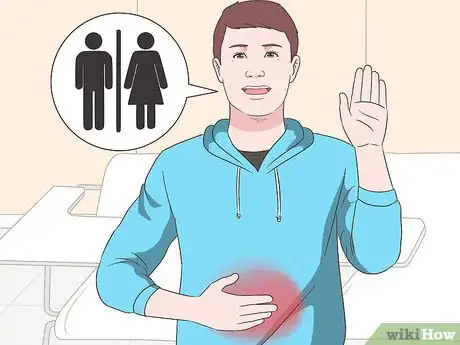
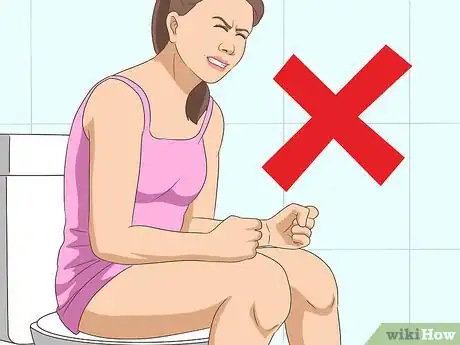

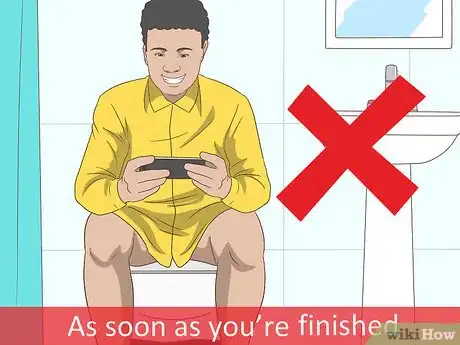

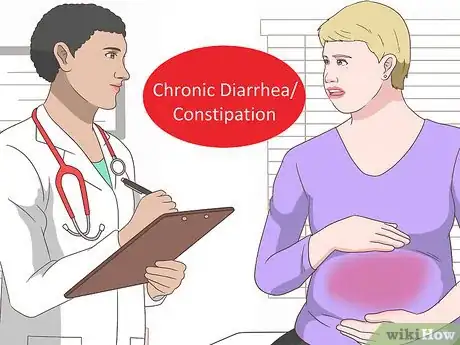
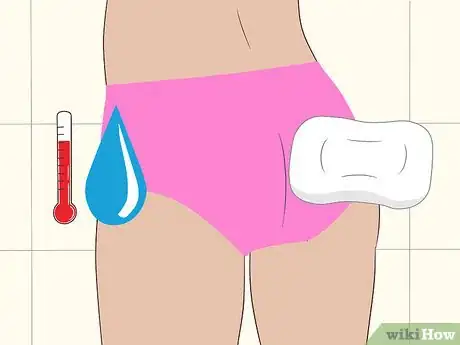

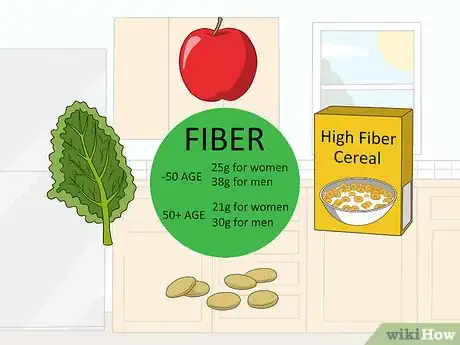
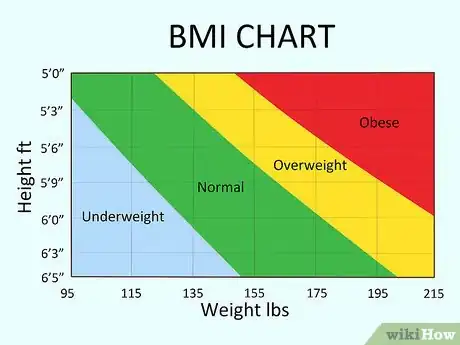
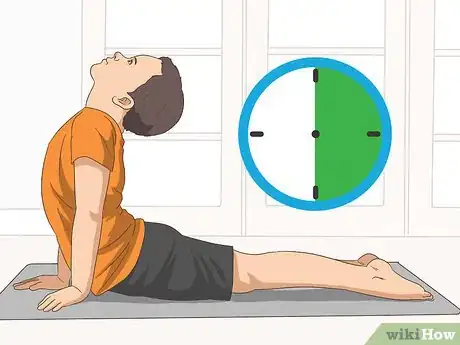
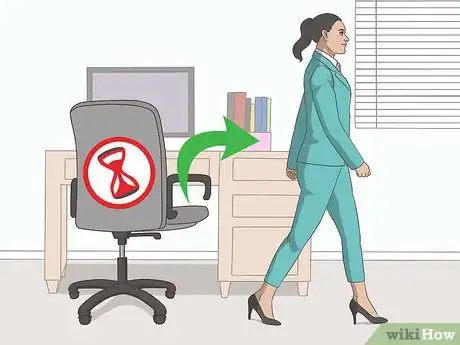


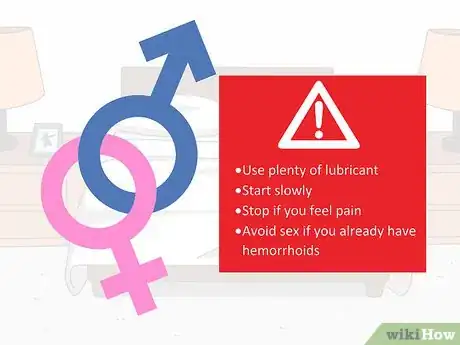







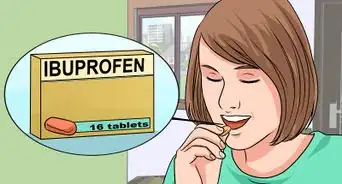





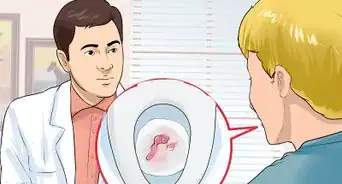









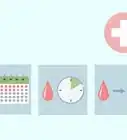



































Medical Disclaimer
The content of this article is not intended to be a substitute for professional medical advice, examination, diagnosis, or treatment. You should always contact your doctor or other qualified healthcare professional before starting, changing, or stopping any kind of health treatment.
Read More...